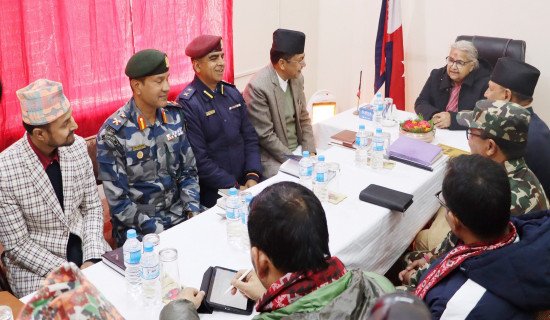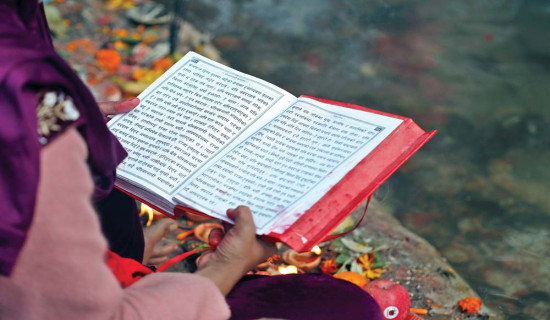- Saturday, 14 February 2026
Gundu blossoming with floriculture
Kathmandu, Oct. 15: Farmers in Gundu of Suryabinayak Municipality-7, Bhaktapur, are currently busy plucking flowers and threading garlands for the fast-approaching Tihar festival. But not just any flower, mind you. Gundu is famous for growing Makhamali (Globe amaranth) flowers.
Traders from Kalimati, Ason, Indra Chowk and other markets of Kathmandu have begun knocking on the doors of the flower cultivators here to collect the flowers considered a must-have for Bhai Tika because of its never-wilting quality. And this provides a once-in-a-year boost to the incomes of the locals.
Farmer Sharmila Bista, 30, said, “We sell each garland of the Makhamali flowers for Rs. 20 to Rs. 25. This is the wholesale rate that we charge the businessmen who come to us to buy the flowers.”
Bista has been in floriculture for around four years and has been cultivating Makhamali in six anaas (190.8 square metres) of land which has been helping her earn up to Rs. 30,000 per season.
“I have already sold 500 garlands this year and hope to make 300 more,” she said, describing her plans for 2022’s Tihar.
Normally, farmers start picking flowers from mid-August and use a cold storage to keep them fresh till Tihar. Bista informed that they were able to get five or six harvests of flowers in a season.
Similarly, another flower farmer Narayani Khatri of the same ward shared that she had been planting the flower in a Ropani (508.74 square metres) of land and had been earning around up to Rs. 100,000 a season.
Bista and Khatri are examples of farmers who have been making a satisfactory living through floriculture instead of farming food or cash crops considered more traditional or mainstream.
Almost every household in Gundu is engaged in flower cultivation, especially Makhamali and marigold which flies of the metaphorical shelves during Nepal’s festival of lights and also find decent markets at other times.
The municipality has also provided grants to the farmers engaged in floriculture through the Sana Kishan Agriculture Co-operatives Ltd. “This is to encourage commercial floriculture in the area,” said Rabindra Sapkota, chairman of Gundu Ward No. 7.
“We are also trying to remove middlemen from the flower business so that the farmers get fairer prices for their produce,” he added.
The ward has asked the Sana Kishan Co-operatives Ltd. to manage markets for the flowers. However, there is scant official data about the volume of transactions and the amount of money generated because businesses buy directly from the flower farmers, away from government oversight and intervention.
Nevertheless, Sapkota draws from various sources to estimate that Gundu framers produce flowers worth Rs. 80 million to Rs. 100 million every year.
“Not only Nepalis living in Nepal but also those living outside the country demand Makhamali during Tihar. This drives up demand and presents income opportunities,” said florist Anita Basnet.
Basnet herself has been supplying flowers to Nepalis living in counties like the United Arab Emirates, South Korea, Japan, the United States and other nations, mainly through personal contact.





-square-thumb.jpg)











